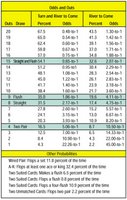 Had a joker of a friend once named Tony who whenever the subject of pot odds came up at the home game would crack wise about the chances of him scoring a dimebag within the next day or two. Tony could be a kick in the pants sometimes.
Had a joker of a friend once named Tony who whenever the subject of pot odds came up at the home game would crack wise about the chances of him scoring a dimebag within the next day or two. Tony could be a kick in the pants sometimes. After the shenanigans, though, Tony usually had the right answers to others' questions about the subject, despite being half-snowed half the time. To give you an example, we had a buddy, Dobby, who from time to time would try to argue that when counting outs everyone mistakenly assumes the best-case scenario. Tony knew better, and would invariably respond to such hooey with startling clarity. Here's how Dobby's argument -- one which we all likely have entertained at some (hopefully early) point in our playing lives -- would go.
You count outs to figure your chances to win the hand, then compare them to the odds the pot are giving you. For example, you're in a 10-handed game of $1/$2 limit hold 'em. Everyone folds to you sitting left of cutoff with Qh 9h. You limp, the cutoff folds, the button folds, the SB calls, and the BB checks. There is $6 in the pot when the flop comes Kh 7c 2d. The table checks, then comes the turn, the Ah. The SB bets $2, the BB folds, and now you have to decide whether to chase the nut flush or turn tail.
Now you've had this explained to you a thousand times already. There are 46 unknown cards, 9 of which are hearts. Assuming your opponent just has a pair of kings (or some other hand that can't improve to a full house), if one of those 9 hearts comes, you're a winner. In other words, you're looking at 37-to-9 or a little worse than 4-to-1 against making your flush. The pot is $8 and you have to put in $2 to call, so the pot odds are exactly 4-to-1. (For more, click on Lou Krieger's handy-dandy chart which appears above and/or check out his helpful article, "Pot Odds Made Easy.")
"You're dreaming if you think you really have 9 outs," Dobby would cry. "All 9 ain't left, so if you think you've got 9 ways to win you've got some high hopes."
Technically, the Dobster's right about it being unlikely to have 9 ways to win. Here 24 cards have been dealt (the 10 hands plus the 4 on the board), and so only 28 remain in the deck. On average, only 5 or 6 of those 28 cards will be hearts, with the other 3 or 4 having been dealt and folded. According to Dobby, since we only likely have 5 or 6 winners left, our odds are down (to 8-to-1 or thereabouts). That's where Dobby's line of reasoning goes haywire, of course. You compare the (let's say) 6 hearts left to the 23 other cards left in the deck, not to the total number of other unseen cards (41). Thus the odds remain about 4-to-1; in fact, if 6 hearts are left your odds are slightly better than average here (with about 21.5% of the possible river cards being hearts).
If all 9 hearts are improbably still in the deck, you're about 2-to-1 to hit the flush. If only one is left, you're down to 27-to-1. And if none are left well then you're whistling in the dark like usual.
None of this matters, of course. Unless you're in some kind of bizarro game where all hands are played face up, you have no way of knowing what cards are spent and what cards remain. So note your outs (making sure they really are outs) and the odds of spiking one, figger your pot odds, and make your play.
Or, as Tony would explain with a glassy-eyed twinkle and dismissive shake of the head, "Pass the Doritos."
No comments:
Post a Comment